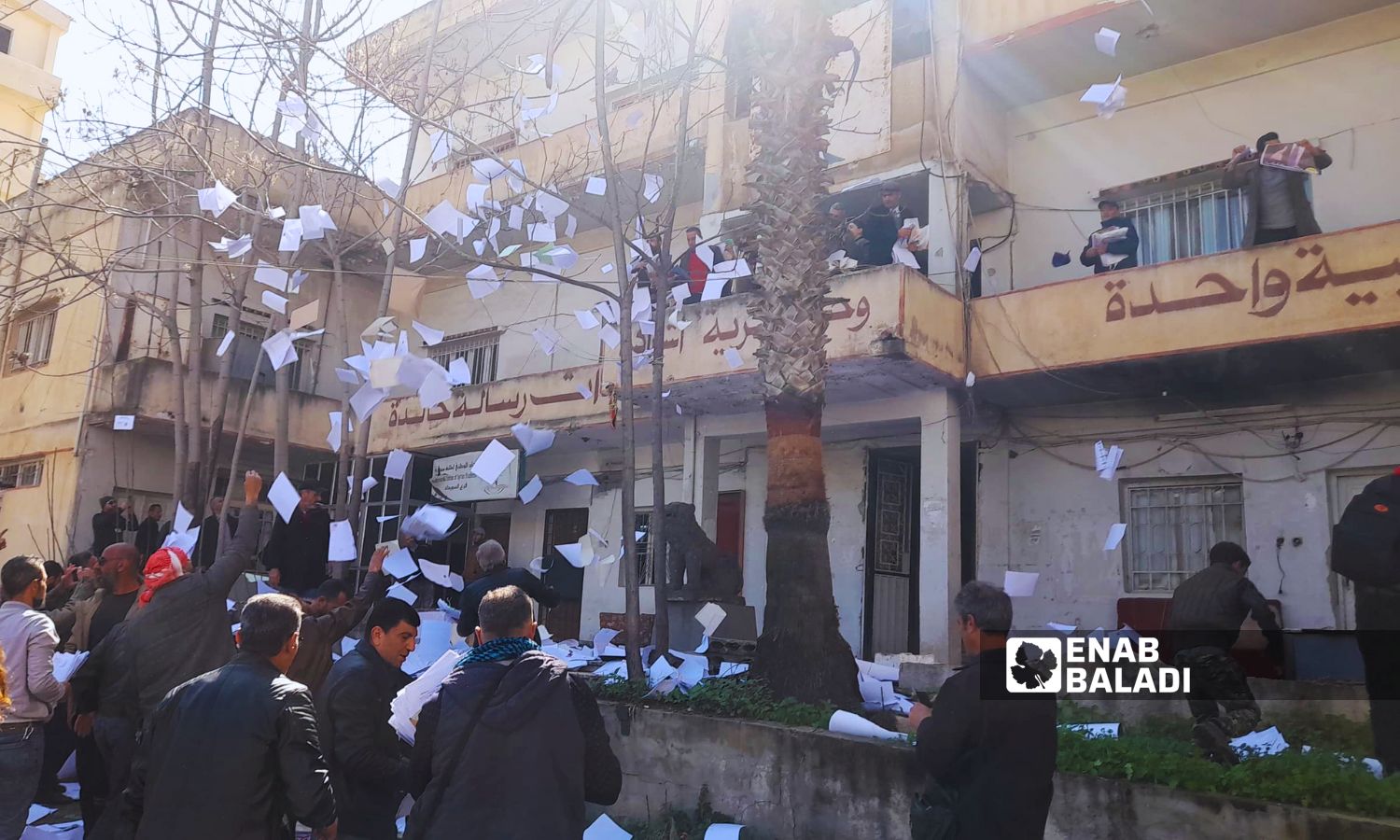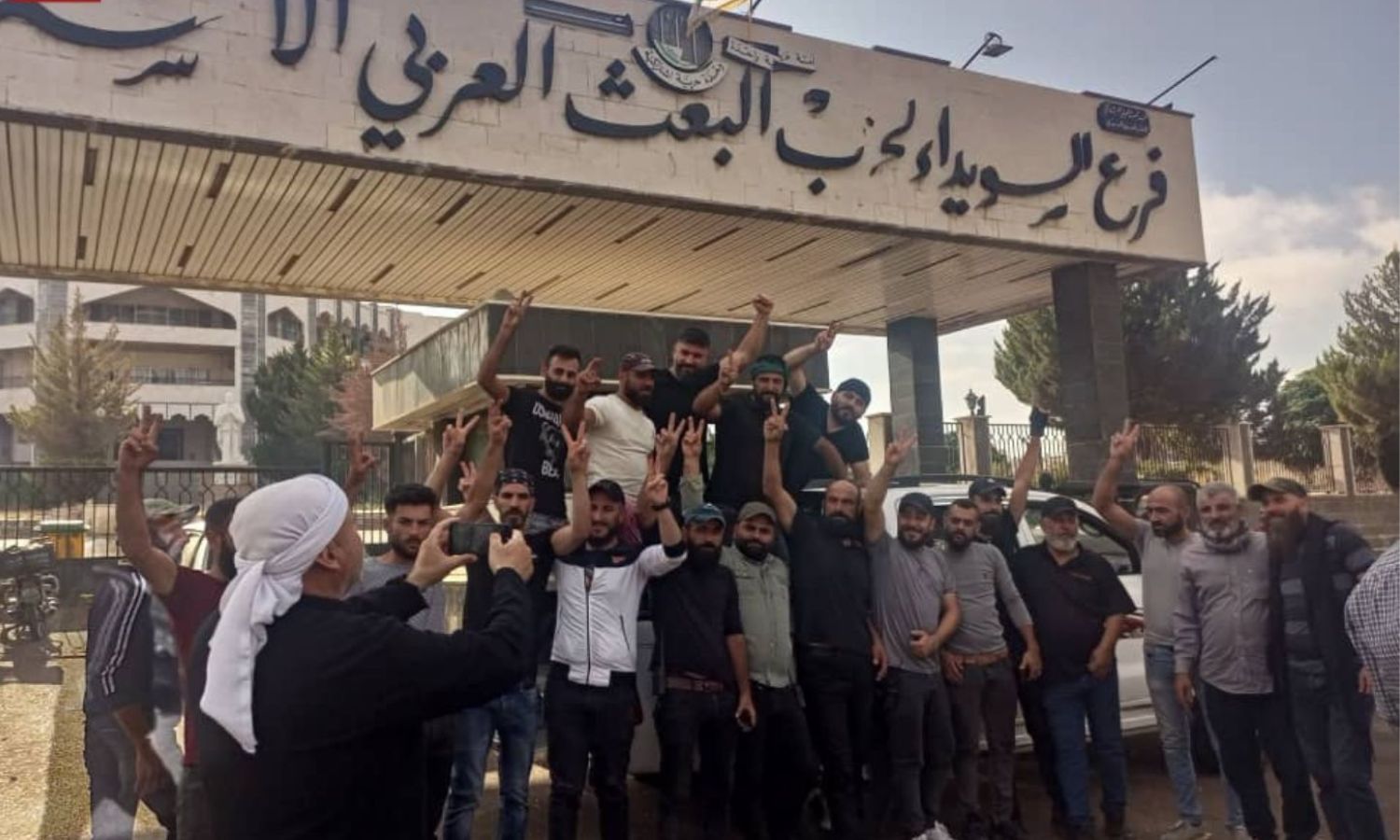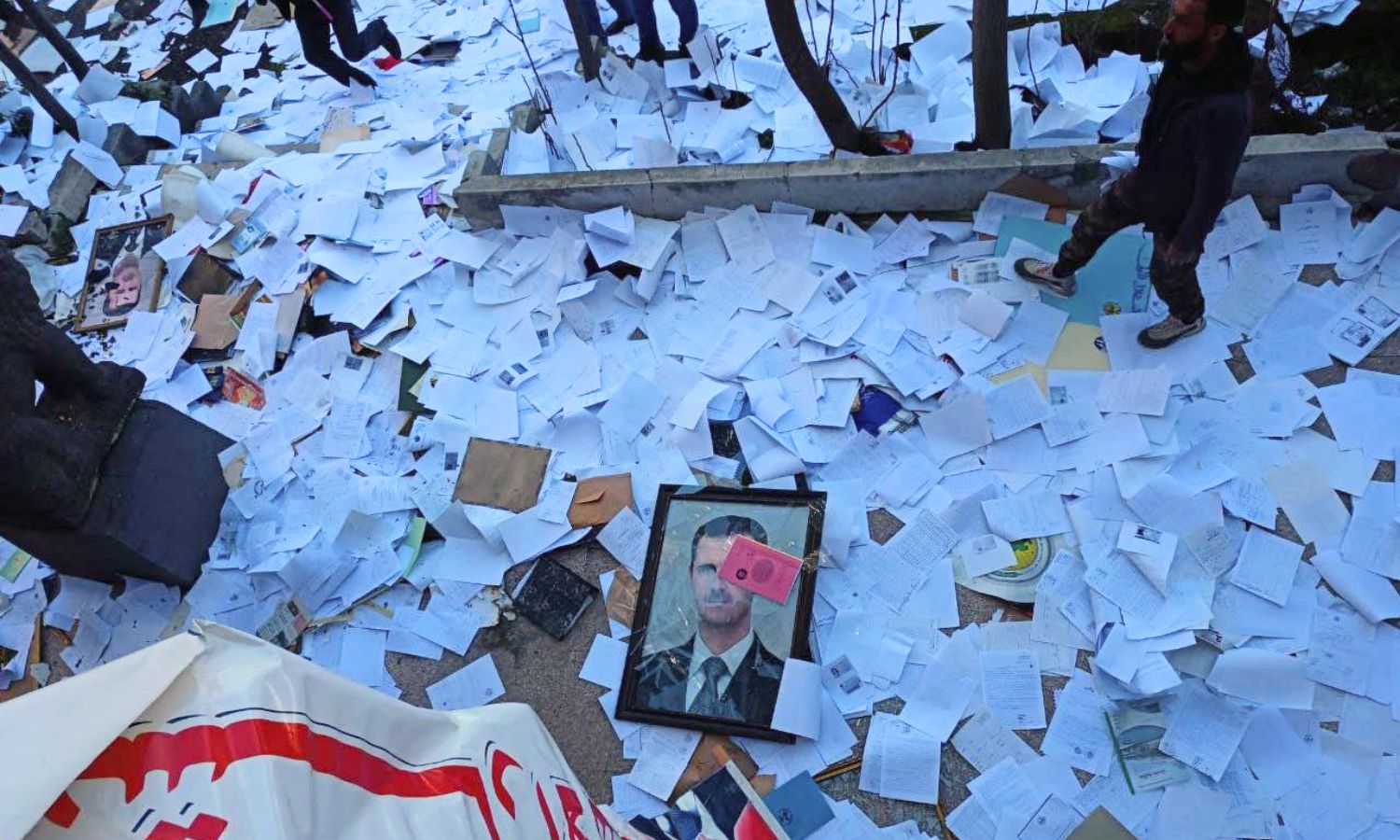



Since August 2023, As-Suwayda governorate has risen up, demanding the fall of the Syrian regime and the implementation of UN resolution “2254,” which calls for a peaceful transition of power in Syria to end the ongoing conflict of years.
The peaceful uprising that has been roaming the streets of the governorate for more than half a year knocked on the doors of the Baath party branches, turning some of them into charity association headquarters and closing parts of others, while protesters scattered the security reports found in party headquarters across the streets.
From time to time, protesters in the province enter the party branches, and the situation seems to be heading towards purging the governorate of the party institution which was previously considered by the spiritual leader of the Druze monotheists’ sect, Sheikh Hikmat al-Hijri, to be one of two institutions the Syrian people suffer from, alongside the security institution.

Protesters in front of the Baath party branch after its closure in As-Suwayda – August 27, 2023 (Suwayda 24)
In the first month of the protests in As-Suwayda, protesters closed the Baath party centers in villages and towns of the governorate following a shooting incident by a security group stationed in the party building in downtown As-Suwayda, with no injuries or damages reported.
At that time, local news websites specialized in covering the news of the governorate published photos and video recordings showing the closure of the party branches in the governorate.
The local news page “al-Raased” published a video recording showing the closure of the Baath party headquarter in the village of al-Ghariyah southwest of the governorate, and in the village of Reima Hazem, protesters closed the Baath Party headquarters, which the residents turned into a charity association premises.
Protesters also closed two headquarters of the Baath party in the towns of al-Mazra’a and al-Ghariyah following the shooting incident, adding that the protesters wanted to convert the building of the al-Ghariyah branch into a kindergarten named “Freedom.”
Jamal al-Shoufi, a political researcher residing in As-Suwayda, told Enab Baladi that the governorate’s rejection of the presence of Baath party branches in As-Suwayda does not come within an organized context, but it is a collective state that the governorate witnesses by rejecting this party institution for its negative influences on Syrian society, including As-Suwayda.
He added that the movements against the party in the governorate are the result of the Baath party’s neglect of the protesters’ demands to stop their work in the governorate, which led to the later closure of these party institutions by the protesters.
At the same time, al-Shoufi did not expect the party institution to disappear from As-Suwayda because it is linked to the current authority in Damascus, a criterion that applies to all Syrian provinces and not just As-Suwayda, and therefore it can only disappear with the fall of the ruling power.
The researcher believes that the idea of the demands for a political change under resolution “2254”, as the people of As-Suwayda claim, has become an idea that means the disappearance of the regime’s political power and the elimination of the Baath party’s dominance over governance in Syria.

Protesters throw security reports from the Baath party branch in the streets of As-Suwayda – February 28, 2024 (Enab Baladi)
The party institution of the Syrian regime has always been the recipient of security reports targeting opponents of the regime, which ultimately leads to their arrest, as revealed by the security reports thrown by the protesters in As-Suwayda into the city streets.
Today, with the uprising movement in As-Suwayda heading towards tightening the grip on the existing party institution in the governorate for decades, it is worth asking about the impact that the disappearance of this institution will have.
Researcher Jamal al-Shoufi believes that the clear trend in the general framework is the demand for political change on the general Syrian level, but this does not mean the absence of visions that say “let’s stop the Baath party in As-Suwayda and later it can be stopped at the level of Syria in general, after effecting a political change,” indicating that this is a possible scenario, but it is not certain.
He added that power in Syria will remain as long as political change does not occur, whether on the security or party side of it, and this can apply to As-Suwayda governorate as well.
The researcher sees that the dominant ideologies, including the Baath party, have not resulted in any positive impact so far, since the beginning of the Arab Spring in 2011, pointing out that this impact may appear to be the opposite from Syria if the Syrian people’s demands to overthrow the regime succeed and are generalized to the rest of the countries in the region.
Since the Baath party carries a comprehensive thought based on a national foundation, the researcher pointed out that the state aspired to by Syrians has not called for the abolition of Syria’s future relations with the Arab environment but only for the abolition of “the bloated hegemony of a single centralizing tendency, of one color, carried by a single party, with a comprehensive tendency that nullifies political action”.
Looking at previous experiences, al-Shoufi believes that the Iraqi experience in uprooting the Baath party has not been positive, as it has brought about many issues on a political level, including sectarian and religious tendencies and political quotas.
The researcher recommended that the demand should not be one of the extremes, either complete retention or complete disappearance, but rather to continue demanding a national state that allows political freedoms.

A protester raises a sign calling on members of the Baath party to defect during a demonstration in As-Suwayda, southern Syria – September 14, 2023 (Suwayda 24/Facebook)
if you think the article contain wrong information or you have additional details Send Correction